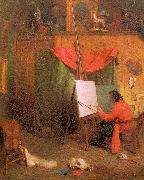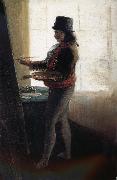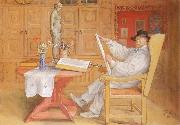Wholesale Oil Painting No Minimum |
|||||||||||
|
|
|||||||||||

|
|||||||||||
|
|
|
||||||||
Beard, William HolbrookAmerican Painter, 1824-1900 |
||||||||
|
|
||||||||
Self-Portrait in the Studio
Self-Portrait in the Studio Painting ID:: 10725 |
1860s, oil on canvas, New York Historical Society 1860s, oil on canvas, New York Historical Society |
|||||||
|
|
||||||||
Francisco Goya1746-1828 Goya is considered the 18th Century's foremost painter and etcher of Spanish culture, known for his realistic scenes of battles, bullfights and human corruption. Goya lived during a time of upheaval in Spain that included war with France, the Inquisition, the rule of Napoleon's brother, Joseph, as the King of Spain and, finally, the reign of the Spanish King Ferdinand VII. Experts proclaim these events -- and Goya's deafness as a result of an illness in 1793 -- as central to understanding Goya's work, which frequently depicts human misery in a satiric and sometimes nightmarish fashion. From the 1770s he was a royal court painter for Charles III and Charles IV, and when Bonaparte took the throne in 1809, Goya swore fealty to the new king. When the crown was restored to Spain's Ferdinand VII (1814), Goya, in spite of his earlier allegiance to the French king, was reinstated as royal painter. After 1824 he lived in self-imposed exile in Bordeaux until his death, reportedly because of political differences with Ferdinand. Over his long career he created hundreds of paintings, etchings, and lithographs, among them Maya Clothed and Maya Nude (1798-1800); Caprichos (1799-82); The Second of May 1808 and The Third of May 1808 (1814); Disasters of War (1810-20); and The Black Paintings (1820-23). |
||||||||
|
|
||||||||
|
|
Self-portrait in the Studio
Self-portrait in the Studio Painting ID:: 38241 |
mk132
1793-195
Oil on canvas
mk132 1793-195 Oil on canvas |
||||||
|
|
||||||||
Carl LarssonSwedish Realist Painter, 1853-1919 Swedish painter, illustrator and printmaker. He came from a poor family and studied (1866-76) at the Konstakademi in Stockholm, supporting himself throughout this period. From 1871 to 1878 he contributed illustrations to the comic journal Kaspar and the Ny illustrerad tidning. From 1875, for several decades, he was a prolific book illustrator, his most renowned work in this field being his drawings for Föltskärns beröttelser ('The Barber-surgeon's tales'; pubd 1883-4) by Zacharius Topelius, and the Rococo-inspired watercolours for the Samlade skaldeförsök ('Collected attempts at poetry'; pubd 1884) by the 18th-century Swedish author Anna Maria Lenngren. |
||||||||
|
|
||||||||
|
|
self-portrait in the Studio
self-portrait in the Studio Painting ID:: 41744 |
mk163
Watercolor
1912
mk163 Watercolor 1912 |
||||||
|
|
||||||||
|
Carl Larsson Swedish Realist Painter, 1853-1919 Swedish painter, illustrator and printmaker. He came from a poor family and studied (1866-76) at the Konstakademi in Stockholm, supporting himself throughout this period. From 1871 to 1878 he contributed illustrations to the comic journal Kaspar and the Ny illustrerad tidning. From 1875, for several decades, he was a prolific book illustrator, his most renowned work in this field being his drawings for Föltskärns beröttelser ('The Barber-surgeon's tales'; pubd 1883-4) by Zacharius Topelius, and the Rococo-inspired watercolours for the Samlade skaldeförsök ('Collected attempts at poetry'; pubd 1884) by the 18th-century Swedish author Anna Maria Lenngren. self-portrait in the Studio mk163 Watercolor 1912 |
||||||||
|
|
||||||||
|
Prev Next
|
||||||||
|
|
||||||||
|
Related Paintings to Carl Larsson :. |
||||||||
|
|
||||||||
|
CONTACT US |



